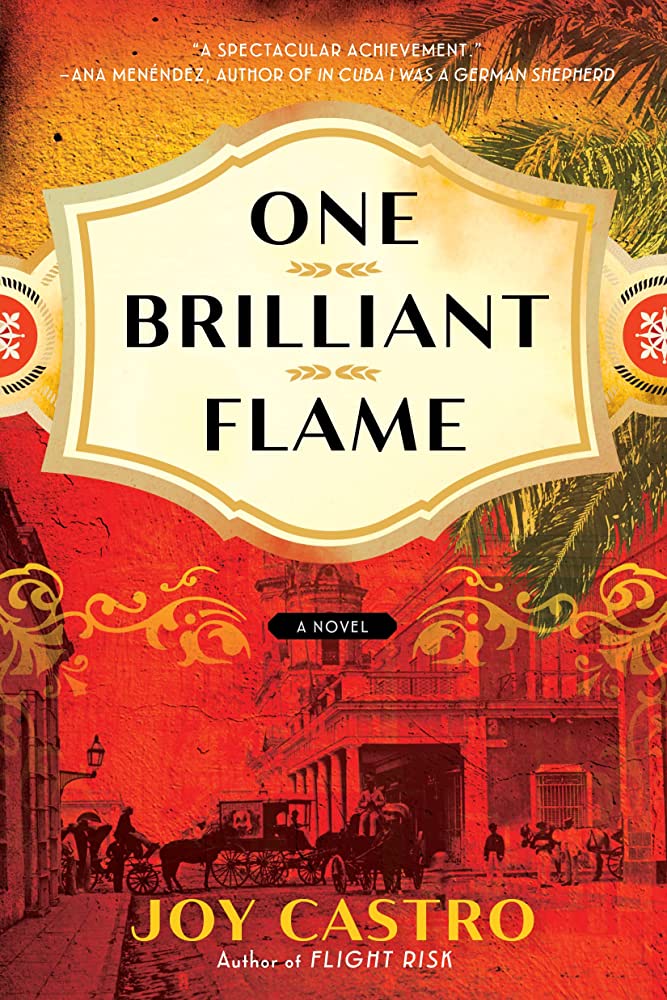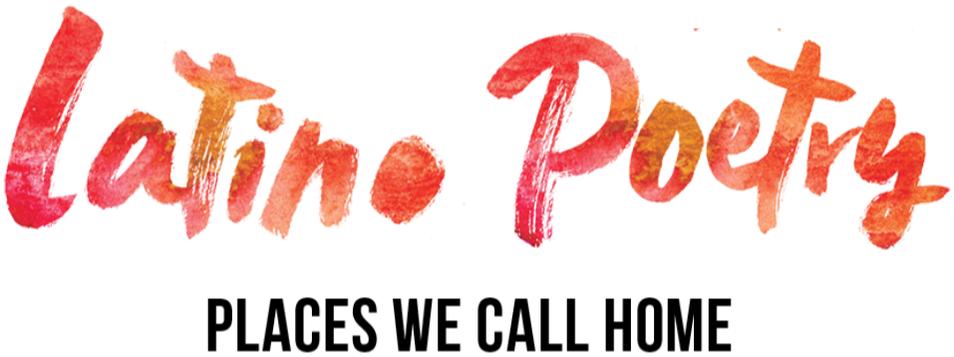Erotic Desire, Trauma, and Political Choices:
An Interview with Joy Castro
Regarding Her Novel, One Brilliant Flame
By Daniel A. Olivas
Quite often, discussions of the Cuban community in Florida revolve around the lives of those who escaped the Communist regime of Fidel Castro’s 1959 revolution and the subsequent shaping of Florida’s political landscape. But for literature professor and writer Joy Castro, her family history in that state stretches back to the late nineteenth century, the contours of which she knew very little until recently.
Castro, who was born in Miami and is currently the Willa Cather Professor of English and Ethnic Studies at the University of Nebraska–Lincoln, discovered family history somewhat late in life when her great-grandfather’s writings came to light upon her own father’s death. On a personal level, Castro learned about the Cuban immigrant community in Key West that had never been discussed either by her family or in her school’s history books. That discovery alone would be remarkable for anyone.
But Castro is also a novelist. The author of both fiction and nonfiction, she is best known for her thrillers including Flight Risk, a finalist for a 2022 International Thriller Award, and the post-Katrina New Orleans novel, Hell or High Water. This newly discovered family history didn’t inspire Castro to write another thriller. Instead, she dug deep into both family and Cuban history and came up with narrative that—while certainly thrilling—is more rooted in historical fiction.
The result is her latest novel, One Brilliant Flame, an evocative and gripping narrative of the Cuban community in late-nineteenth century Key West and the booming cigar industry that made it one of the most prosperous cities in Florida. But the city also served as a rebel base for Cuba’s anticolonial insurgency against Spain which Castro tells through the voices of six young friends each with their own, often conflicting hopes and dreams. Their stories play out against the backdrop of the looming Great Fire of Key West in 1886 that destroyed a significant portion of the city and is the largest and most devastating fire in Key West history.
I spoke with Castro about her discovery of family history and how she used that discovery to create a very personal novel that explores the complex and vibrant Cuban community of nineteenth-century Key West.
Castro, who was born in Miami and is currently the Willa Cather Professor of English and Ethnic Studies at the University of Nebraska–Lincoln, discovered family history somewhat late in life when her great-grandfather’s writings came to light upon her own father’s death. On a personal level, Castro learned about the Cuban immigrant community in Key West that had never been discussed either by her family or in her school’s history books. That discovery alone would be remarkable for anyone.
But Castro is also a novelist. The author of both fiction and nonfiction, she is best known for her thrillers including Flight Risk, a finalist for a 2022 International Thriller Award, and the post-Katrina New Orleans novel, Hell or High Water. This newly discovered family history didn’t inspire Castro to write another thriller. Instead, she dug deep into both family and Cuban history and came up with narrative that—while certainly thrilling—is more rooted in historical fiction.
The result is her latest novel, One Brilliant Flame, an evocative and gripping narrative of the Cuban community in late-nineteenth century Key West and the booming cigar industry that made it one of the most prosperous cities in Florida. But the city also served as a rebel base for Cuba’s anticolonial insurgency against Spain which Castro tells through the voices of six young friends each with their own, often conflicting hopes and dreams. Their stories play out against the backdrop of the looming Great Fire of Key West in 1886 that destroyed a significant portion of the city and is the largest and most devastating fire in Key West history.
I spoke with Castro about her discovery of family history and how she used that discovery to create a very personal novel that explores the complex and vibrant Cuban community of nineteenth-century Key West.
|
DANIEL A. OLIVAS: In an author’s note, you explain that the novel's inspiration grew from family history including writings of your great-grandfather, Juan Pérez Rolo, who wrote an eyewitness memoir of late nineteenth-century Key West, which was a rebel base for the anticolonial insurgency in Cuba. What was it about these and other source materials that convinced you to write historical fiction rather than a family history?
JOY CASTRO: My great-grandfather’s book, Mis Recuerdos—which we found when my father died—made me so curious about Key West and its Cuban émigré community during the late nineteenth century, about which I knew nothing. No one in my family ever talked about it, and I never encountered a discussion of it in any of my history classes in high school or college. To learn more, in 2019 I attended a National Endowment for the Humanities research institute in Tampa, where we spent a month with scholarly experts, studying the larger context of Cuban cigar towns in Florida and how they contributed to Cuba’s anticolonial struggle against Spain during the period. It was incredibly illuminating. At that institute, my imagination was really provoked by learning that the Great Fire of Key West in 1886 was believed at the time to have been deliberately set by an arsonist, but no one could ever prove it. Immediately, the thriller-writer in me perked right up and started playing with possibilities. I’m not trained as a historian, so writing a family history didn’t seem like a real possibility for me. There are archival skills I just don’t possess. Moreover, there are so many gaps in my own family’s chronicle that it would have felt unsatisfying. For example, the voices of women in my family would have been entirely left out; that record just doesn’t exist. My own scholarly training is in literature, and I’ve written novels before, so fiction as a medium felt far more possible for me. To create a seamless and believable narrative, I relied heavily—and gratefully—on the work of historians such as Ada Ferrer, Gerald Poyo, and Consuelo Stebbins, and then I filled in the gaps with my own imagination and hypotheses. |
When you purchase a book through our site, we earn an affiliate commission and so do independent book stores.
|
OLIVAS: Rather than offering readers a traditional third-person omniscient novel, you tell your story in alternating first-person narratives of six main characters. Did you begin writing your novel in this form, or did it develop over time? How did you determine that this approach best suited for your story?
CASTRO: I love novels told by multiple narrators—when there’s a strong justification for the structure—like William Faulkner’s As I Lay Dying and Louise Erdrich’s Love Medicine, which capture the stories of whole communities. As with those novels, in One Brilliant Flame, I wanted to chronicle the story of an entire community from the perspectives of characters who occupy different sociopolitical categories, to show how the same events can look so different depending on where you stand in terms of class, gender, race, sexuality, religion, neurodiversity, and differing political commitments. Key West in the 1880s was an incredibly prosperous, cosmopolitan, small city, yet it was conflict-ridden due to its anticolonial politics, labor politics, and racial politics, and I wanted to present those conflicts from the perspectives of people who occupied different sides of the issues and had very different investments in those struggles. From the moment the idea for One Brilliant Flame occurred to me, I always knew that multiple first-person narrators were the right form for this story.
It was an ambitious leap for me, because my previous three novels were all each narrated by a single, unitary, first-person voice, so I felt a lot of nervous excitement about the challenge of creating six clearly distinct voices to express a multiplicity of viewpoints. During revision, I did a lot of reading aloud to make sure they each had their own unique rhythm and sound.
OLIVAS: The true core of your novel is comprised of three women—Zenaida, Chaveta, and Sofia—who are of different economic classes, ethnic backgrounds, and gender identities. Were these characters based on actual people, and how did you walk the line between late nineteenth-century and modern-day sensibilities with respect to such issues as sexism, racism, and homophobia?
CASTRO: They’re definitely composites of traits of real people I’ve known and loved, along with traits of my own. And the same is true of the three men who narrate chapters of the novel: Feliciano, Líbano, and Maceo. (Feliciano, the lector and poet, bears the name of my grandfather, who was also a lector and poet; Líbano was my father’s name.) There’s a little bit of me in each of the main characters, and I made sure that each one had vulnerabilities, weaknesses, and flaws as well as admirable, desirable qualities. That kind of ethically and emotionally textured realism feels believable to me.
Walking the line between nineteenth-century sensibilities and twenty-first century views on issues such as gender, race, and sexuality was made a bit easier by the fact that the narrators were first-person. That is, the structure allowed me to observe and express things in their interior monologues that they wouldn’t have been free to express publicly—at least, not safely—at that time. Over a period of decades, I’ve been reading novels from the 1800s, as well as eyewitness documentary accounts, so I’ve developed a general sense of the linguistic, social, and psychological norms of the era, and then I just tried to interpret those norms for contemporary readers in a prose style that was sleek, noirish, and propulsive.
I also wanted to fold in some elements that many nineteenth-century novels omit, such as sex and labor. I wanted the characters to have erotic lives as rich and complicated and vexing as our own, not to just obsess about their marital prospects. Regarding labor, those nineteenth-century novels in which people just endlessly have tea and witty conversation always used to crack me up when I was a graduate student, because my own experience had always included a great deal of work. I’ve dug ditches; I’ve worked on the line in a factory; I’ve been a security guard, making the rounds at night alone in the dark, and I’ve waited way too many tables. I wanted labor to play a significant role in this text, so there are chapters in which I play with that trope of tea and conversation, or fancy dinner parties where the characters debate art and politics, but there are also chapters in which Zenaida and her mother are so exhausted from laboring all day in their boardinghouse that they can barely talk, and chapters in which Chaveta is rolling cigars for hours on end in the factory. Manual work can be grueling, but it also contains a beauty, grace, and poetry of its own. I wanted my novel to include that.
OLIVAS: In writing this novel, did you learn anything new about yourself—as a writer—and about the craft of writing?
CASTRO: I learned how profoundly, deeply meaningful it felt to honor my ancestors with my work by bringing their own historical moment alive for a broad audience. With this novel, I feel like I’m actively fulfilling my responsibility to them—like I’m living up to my inheritance.
Historical fiction was very new for me—I’d only ever written a single short story that was historically based before—and balancing the accounts of multiple narrators, as well as writing from male narrators’ perspectives, were also new challenges, so I learned by doing. I was also very interested in exploring the links among erotic desire, trauma, and political choices, as well as how people’s lives are powerfully influenced by the secrets kept by previous generations. I wasn’t sure I’d be able to pull all that off successfully. It felt like I was juggling a lot.
Overall, by tackling various challenges and bringing an ambitious project to fruition for the sake of a larger purpose, I gained a lot of confidence in my abilities as a writer, and I feel a powerful sense of communion with my family legacy.
CASTRO: I love novels told by multiple narrators—when there’s a strong justification for the structure—like William Faulkner’s As I Lay Dying and Louise Erdrich’s Love Medicine, which capture the stories of whole communities. As with those novels, in One Brilliant Flame, I wanted to chronicle the story of an entire community from the perspectives of characters who occupy different sociopolitical categories, to show how the same events can look so different depending on where you stand in terms of class, gender, race, sexuality, religion, neurodiversity, and differing political commitments. Key West in the 1880s was an incredibly prosperous, cosmopolitan, small city, yet it was conflict-ridden due to its anticolonial politics, labor politics, and racial politics, and I wanted to present those conflicts from the perspectives of people who occupied different sides of the issues and had very different investments in those struggles. From the moment the idea for One Brilliant Flame occurred to me, I always knew that multiple first-person narrators were the right form for this story.
It was an ambitious leap for me, because my previous three novels were all each narrated by a single, unitary, first-person voice, so I felt a lot of nervous excitement about the challenge of creating six clearly distinct voices to express a multiplicity of viewpoints. During revision, I did a lot of reading aloud to make sure they each had their own unique rhythm and sound.
OLIVAS: The true core of your novel is comprised of three women—Zenaida, Chaveta, and Sofia—who are of different economic classes, ethnic backgrounds, and gender identities. Were these characters based on actual people, and how did you walk the line between late nineteenth-century and modern-day sensibilities with respect to such issues as sexism, racism, and homophobia?
CASTRO: They’re definitely composites of traits of real people I’ve known and loved, along with traits of my own. And the same is true of the three men who narrate chapters of the novel: Feliciano, Líbano, and Maceo. (Feliciano, the lector and poet, bears the name of my grandfather, who was also a lector and poet; Líbano was my father’s name.) There’s a little bit of me in each of the main characters, and I made sure that each one had vulnerabilities, weaknesses, and flaws as well as admirable, desirable qualities. That kind of ethically and emotionally textured realism feels believable to me.
Walking the line between nineteenth-century sensibilities and twenty-first century views on issues such as gender, race, and sexuality was made a bit easier by the fact that the narrators were first-person. That is, the structure allowed me to observe and express things in their interior monologues that they wouldn’t have been free to express publicly—at least, not safely—at that time. Over a period of decades, I’ve been reading novels from the 1800s, as well as eyewitness documentary accounts, so I’ve developed a general sense of the linguistic, social, and psychological norms of the era, and then I just tried to interpret those norms for contemporary readers in a prose style that was sleek, noirish, and propulsive.
I also wanted to fold in some elements that many nineteenth-century novels omit, such as sex and labor. I wanted the characters to have erotic lives as rich and complicated and vexing as our own, not to just obsess about their marital prospects. Regarding labor, those nineteenth-century novels in which people just endlessly have tea and witty conversation always used to crack me up when I was a graduate student, because my own experience had always included a great deal of work. I’ve dug ditches; I’ve worked on the line in a factory; I’ve been a security guard, making the rounds at night alone in the dark, and I’ve waited way too many tables. I wanted labor to play a significant role in this text, so there are chapters in which I play with that trope of tea and conversation, or fancy dinner parties where the characters debate art and politics, but there are also chapters in which Zenaida and her mother are so exhausted from laboring all day in their boardinghouse that they can barely talk, and chapters in which Chaveta is rolling cigars for hours on end in the factory. Manual work can be grueling, but it also contains a beauty, grace, and poetry of its own. I wanted my novel to include that.
OLIVAS: In writing this novel, did you learn anything new about yourself—as a writer—and about the craft of writing?
CASTRO: I learned how profoundly, deeply meaningful it felt to honor my ancestors with my work by bringing their own historical moment alive for a broad audience. With this novel, I feel like I’m actively fulfilling my responsibility to them—like I’m living up to my inheritance.
Historical fiction was very new for me—I’d only ever written a single short story that was historically based before—and balancing the accounts of multiple narrators, as well as writing from male narrators’ perspectives, were also new challenges, so I learned by doing. I was also very interested in exploring the links among erotic desire, trauma, and political choices, as well as how people’s lives are powerfully influenced by the secrets kept by previous generations. I wasn’t sure I’d be able to pull all that off successfully. It felt like I was juggling a lot.
Overall, by tackling various challenges and bringing an ambitious project to fruition for the sake of a larger purpose, I gained a lot of confidence in my abilities as a writer, and I feel a powerful sense of communion with my family legacy.
Comment Box is loading comments...
|
|









